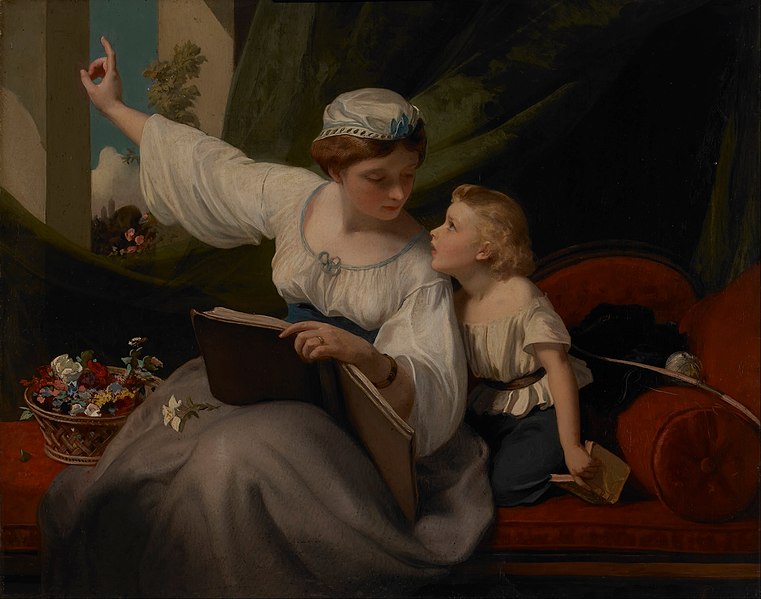Book Update on Adventures of Faith, Hope and Charity – Finding Patience
Progress on my first children’s book titled, Adventures of Faith, Hope and Charity – Finding Patience, is coming along nicely. Meet Faith, age 8, Hope, age 5, and Charity age 3. In this book, these three sisters learn the value of the virtue of patience – a book for children ages 4-6. Read more about these lovely girls…
Tag: Education
Becoming your children's spiritual director

Have you ever thought of having a spiritual director for your kids or grandkids? Have you ever thought of being one? It’s not enough to teach children “religion”–i.e., Catechism. We also need to teach them how to become saints.
I am developing a spiritual growth plan for my three older children. (J is a little too young at age three!) Here are the areas I am considering:
TemperamentD is almost purely choleric, M is melancholic-phlegmatic, and C is primarily phlegmatic. (I haven’t completely figured him out yet–he’s eight and doesn’t know himself as well as the others do.)
Each of the four classical temperaments has a different perspective on life. Each has typical strengths and weaknesses. I seek to encourage my boys in their strengths and help them fight their weaknesses. I plan to do much of this through reading. Books will inspire them where lectures won’t.
Talents and interestsTemperament is only one part of personality. Each child has unique talents. For example, cholerics are bursting with energy, but one may be good at football and another at track.
Quiet and reserved M has a surprising acting ability.
How can my children use their gifts to glorify God? How can their talents help them choose a vocation and a career?
Continue reading at Contemplative Homeschool.
Advent activites for your family
Advent is here and with it our six-week break from homeschooling. Instead of doing school work, we do an activity each day preparing for Christmas. Some are distinctly religious. Others are not. Here are some ideas for activities you can do with your family.
Learn and sing Advent hymns
Sunday at Mass, D was amazed that I knew many of the verses of O Come, O Come, Emanuel by heart. Well, that was the only Advent hymn I learned in Catholic school, and I don’t recall singing any other one at Mass in the 70s and 80s. It wasn’t until I started praying the Divine Office as an adult that I learned some of the beautiful hymns I had been missing. Here are some you will want to learn along with your kids, if you don’t know them already:
People, Look East. This song by poet Eleanor Farjeon helps you to see all the preparations for Christmas–including setting a merry table–as preparations for Christ. This is a good one to start your Advent.Wake, Awake, the Night is DyingCome, Thou Long-Expected JesusO Come, O Come Emanuel. Sing this one beginning December 17, when the Church prays the O Antiphons.Behold, a Rose of Judah. My personal favorite for Advent, save this one for the last week or two before Christmas.
Read the rest of the ideas at Contemplative Homeschool.
Educate your kids for divine union

Through prayer and study, I’ve created a list of the elements of an education that I think best starts children on this road. Divine union comes through living a life of prayer and virtue. So, generally speaking, we want to teach about prayer and virtue, model them, and practice them with our children. But we also want a home and a school environment that is conducive to prayer and virtuous living.
Prayer requires leisure The Greek work schole, from which “school” comes, means “not-at-work time.” In classical society, school was a leisure activity, a pursuit of wisdom that had little to do with the workaday world. The truest education is free or liberal. It is not “useful” in a utilitarian sense. It is not servile. It is learning about things that are valuable in themselves, rather than means to obtain what we desire.
I wrote about leisure’s importance several months ago. Besides the suggestions you can read in my previous post, teach your kids to have an attitude of openness to learning and to God. Humility is one of the most important virtues to cultivate. Teach them to ask, seek, and knock. Show them that learning is a lifetime venture. Only God has all the answers. Continue learning yourself, especially about the faith. Model awe. Teach your children proper respect.
Try to bring these fundamental questions to each subject: What is man? What is my purpose in life? Discuss them in math, science, literature, art–even physical education. Orient everything towards our highest good.
Contrary to the notion popular in our culture, leisure is not the same thing as entertainment. True leisure never leaves us as spectators. It requires us to participate with our minds, hearts, or bodies. True leisure is time to think, to imagine, and to love. For kids especially, that also means time to play.
Continue reading at Contemplative Homeschool.


